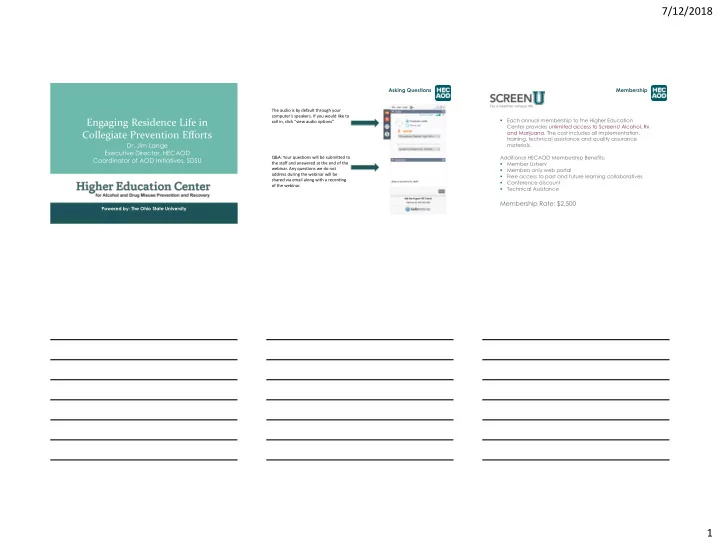

7/12/2018 Asking Questions Membership The audio is by default through your computer’s speakers. If you would like to Each annual membership to the Higher Education Engaging Residence Life in call in, click “view audio options” Center provides unlimited access to ScreenU Alcohol, Rx and Marijuana. The cost includes all implementation, Collegiate Prevention Efforts training, technical assistance and quality assurance Dr. Jim Lange materials. Executive Director, HECAOD Additional HECAOD Membership Benefits: Q&A: Your questions will be submitted to Coordinator of AOD Initiatives, SDSU the staff and answered at the end of the Member Listserv webinar. Any questions we do not Members only web portal address during the webinar will be Free access to past and future learning collaboratives shared via email along with a recording Conference discount of the webinar. Technical Assistance Membership Rate: $2,500 Powered by: The Ohio State University 1
7/12/2018 Our Presenter Ecological Model Comprehensive Strategy Motivation Focus Enforcement and Access Behavioral Alternatives Community Action Research Dr. Jim Lange Executive Director, HECAOD Coordinator of AOD Initiatives, SDSU 2
7/12/2018 Alternatives can also mean housing options: Ecological Model The RA’s role: consistency and success Results of Michigan study Laid back vs By the book Rubington 1993 and 1996 Consistency across RA’s helps (Kilmer, 2018) “the very second that one person is ‘good cop’ Max Drinks and lets someone go or looks the other way, Past 28 days they have effectively made anyone trying to do their job ‘bad cop’ when they enforce policies.” Underestimating support for enforcement is reflective of a normative misperception (Saltz, 2007). McCabe, S. E., Boyd, C. J., Cranford, J. A., Slayden, J., Lange, J. E., Reed, M. B., … Scott, M. S. (2007). Alcohol involvement and participation in residential learning communities among first-year college Kilmer, J. (2018). Prevalence, Trends, Prevention, and Conversations in a Changing Legal Climate. In Promoting Behavioral Health and Reducing Risk among College Students: A Comprehensive Approach (1 edition) Cimini, M. D., & Rivero, E. M. (Eds.). New York, NY: Routledge. students. Journal of Studies on Alcohol and Drugs, 68(5), 722 – 726. Rubington, E. (1993). College drinking and social control. Journal of Alcohol and Drug Education , 39 (1), 56 – 65. Rubington, E. (1990). Drinking in the Dorms: A Study of the Etiquette of RA-Resident Relations. Journal of Drug Issues , 20 (3), 451 – 461. Saltz, R. F. (2007). How do college students view alcohol prevention policies? Journal of Substance Use , 12 (6), 447 – 460. 3
7/12/2018 Norms perceptions on drinking interact with Housing ’s role in norm misperception Does everyone understand the point of MI identity (correction) consequences: Barriers to using programs Unintentional “normalizing” speak as attempt Logan, Diane, Jason R. to relate Kilmer, and Timothy C. Marchell . “Connection Normalizing activities versus Enforcement: Lessons Learned from the Alternative timing: Fear of competition ‘Teachable Moments.’” San Scare tactic programming Diego, CA, 2014. Believing the residents’ bystander effect and Following the sanction effect the ADP approach … fear of social failure means no second hand ” suggests that the immediate effect. effects may be undermined or at least not maintained in Second hand effects can exacerbate norm an education-only program .” misperception (Boekeloo et al, 2009) which may create a cycle Reed, M. B., Lange, J. E., Ketchie, J. M., & Clapp, J. D. (2007). The relationship between social identity, normative information, and college student drinking. Social Logan, D. E., Kilmer, J. R., King, K. M., & Larimer, M. E. (2015). Alcohol Interventions for Boekeloo, B. O., Bush, E. N., & Novik, M. G. (2009). Perceptions About Residence Hall Wingmates and Influence , 2 , 269 – 294. Mandated Students: Behavioral Outcomes From a Randomized Controlled Pilot Study. Alcohol-Related Secondhand Effects Among College Freshmen. Journal of American College Health , Journal of Studies on Alcohol and Drugs , 76 (1), 31 – 37. 57 (6), 619 – 628. 4
7/12/2018 A few additional observations A utilitarian view of collaboration Building inroads: WIIFM Lay expertise is a barrier to asking for help from campus Bulletin Boards in a Box professionals Access to students Supporting their Organizational structure may not naturally lead to collaborative Delivery of information interests, access and relationships Delivering students (actually getting them to your expertise (e.g., Aztec Social consequences are high for RAs: both for action and event) inaction. They take it personally and have to live in the Nights, Learning Source of information on students environment Centers) Gray areas and very hard to detect issues are popping up: Ready set of highly competent peers Work with admin to cannabis, Rx… include wellness events Often want to know about signs of misuse and recovery support in their 1 st week activity Physical layout of the living environment can dramatically affect both the misuse potential and an RA’s ability to intervene 5
7/12/2018 Taking an Improvement Approach Questions? Quality Improvement Using Plan-Do-Study-Act - STEPS October 15-18, 2018 Forward. (n.d.). Retrieved June 30, 2018, from Pre-Conference Sessions: https://www.stepsforward.or g/modules/pdsa-quality- improvement Recovery Is Spoken Here Recovery Ally Trainer of Trainers Motivational Interviewing: Using the Science of MI for Conversations that Work! 6
7/12/2018 Connect with HECAOD! [ @ HECAOD ] Follow us for the latest research and news, information on upcoming events and training resources to support your campus. WEB: hecaod.osu.edu EMAIL: hecaod@ osu.edu PHONE: 61 4-292-5572 HEC AOD Higher Education Center for Alcohol and Drug Misuse Prevention and Recovery 7
Recommend
More recommend